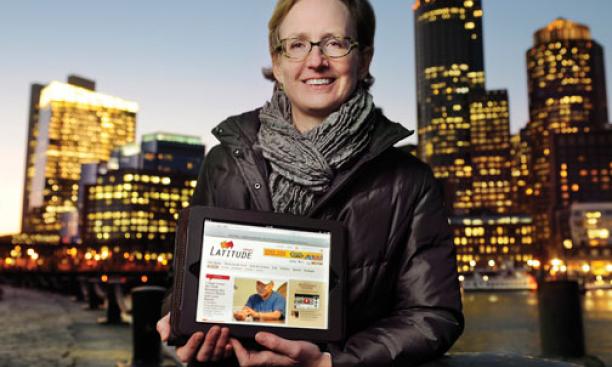

A New Jersey native, Maria Balinska ’82 spent her childhood in five different countries and came to college with a shortwave radio, listening at night to the BBC, Radio Moscow, and Radio Tirana, out of communist Albania. She has long been passionate about world news. Eventually she realized her dream of landing a position with the BBC — and spent much of her time there producing international-affairs programs for radio. Those shows focused on storytelling and getting to the “intersection of the global and the local,” she says, by reporting on events and issues in other countries that related to the concerns and daily lives of people in the United Kingdom.
When Balinska took a break to go to Harvard on a Nieman Fellowship, it became clear to her that there was a lack of that kind of coverage in the United States. So Balinska raised funds, moved back to the United States, and in 2011 launched the journalism website Latitude News (latitudenews.com). The closing of foreign news bureaus made room for international news coverage in nontraditional ways, she says.
Traditional news coverage tends to separate international news into categories such as wars, disasters, and policy, but the Cambridge, Mass.-based Latitude News has a different approach, taking the emphasis off major events and placing it on seemingly more minor but equally relevant stories that U.S. readers can connect with. Balinska says readers should think of the site less as being about the foreign and unfamiliar and more as being about something “in your backyard” that has international dimensions.
One article linked New Jersey’s proposed ban on plastic bags to existing surcharges on plastic bags in Ireland and China. Another article looked at a Swedish solution to a common U.S. problem, bullying in high school. Latitude News also covers politics and business, using strong narratives to spotlight how people in the United States are affected by (and affect) developments in other countries. For example, a story about the war in Syria focused on an organization of Syrian-American doctors who are providing training for Syrian doctors and giving help in refugee camps.
Balinska has gone from doing all the work herself to overseeing three full-time employees and a network of 60 freelancers around the globe, including in the United States. Readers can expect one to two new articles daily from Latitude News written in a tone Balinska describes as “reliable, relaxed,” and “kind of cheeky.”
